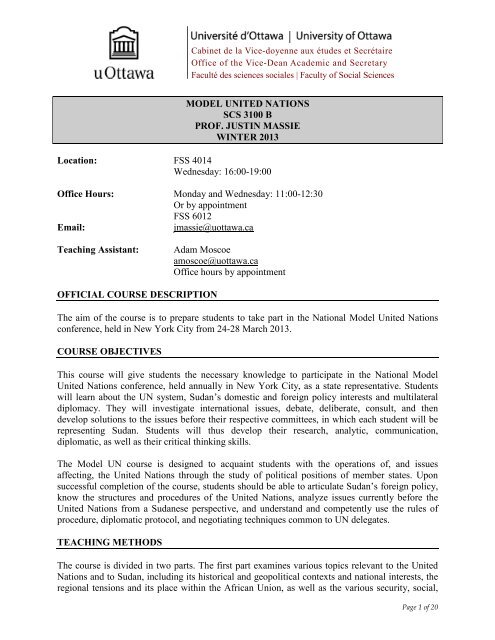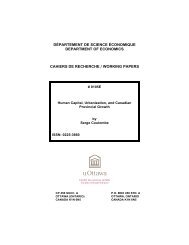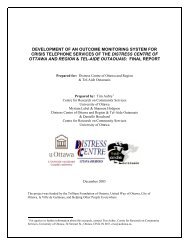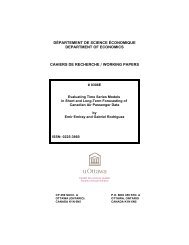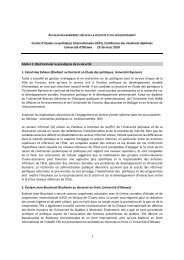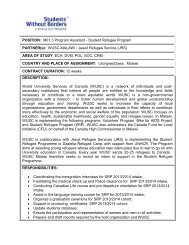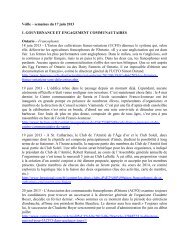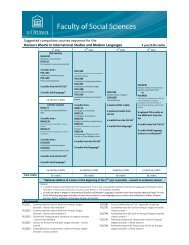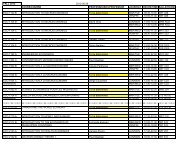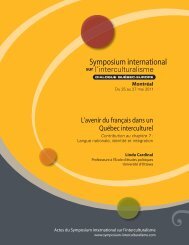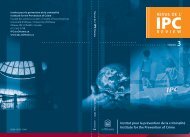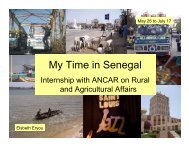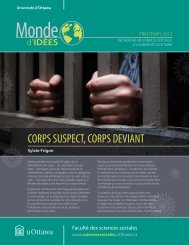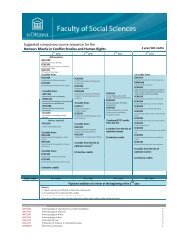Winter 2013 syllabus - Faculty of Social Sciences
Winter 2013 syllabus - Faculty of Social Sciences
Winter 2013 syllabus - Faculty of Social Sciences
You also want an ePaper? Increase the reach of your titles
YUMPU automatically turns print PDFs into web optimized ePapers that Google loves.
Cabinet de la Vice-doyenne aux études et Secrétaire<br />
Office <strong>of</strong> the Vice-Dean Academic and Secretary<br />
Faculté des sciences sociales | <strong>Faculty</strong> <strong>of</strong> <strong>Social</strong> <strong>Sciences</strong><br />
MODEL UNITED NATIONS<br />
SCS 3100 B<br />
PROF. JUSTIN MASSIE<br />
WINTER <strong>2013</strong><br />
Location: FSS 4014<br />
Wednesday: 16:00-19:00<br />
Office Hours: Monday and Wednesday: 11:00-12:30<br />
Or by appointment<br />
FSS 6012<br />
Email:<br />
jmassie@uottawa.ca<br />
Teaching Assistant:<br />
Adam Moscoe<br />
amoscoe@uottawa.ca<br />
Office hours by appointment<br />
OFFICIAL COURSE DESCRIPTION<br />
The aim <strong>of</strong> the course is to prepare students to take part in the National Model United Nations<br />
conference, held in New York City from 24-28 March <strong>2013</strong>.<br />
COURSE OBJECTIVES<br />
This course will give students the necessary knowledge to participate in the National Model<br />
United Nations conference, held annually in New York City, as a state representative. Students<br />
will learn about the UN system, Sudan’s domestic and foreign policy interests and multilateral<br />
diplomacy. They will investigate international issues, debate, deliberate, consult, and then<br />
develop solutions to the issues before their respective committees, in which each student will be<br />
representing Sudan. Students will thus develop their research, analytic, communication,<br />
diplomatic, as well as their critical thinking skills.<br />
The Model UN course is designed to acquaint students with the operations <strong>of</strong>, and issues<br />
affecting, the United Nations through the study <strong>of</strong> political positions <strong>of</strong> member states. Upon<br />
successful completion <strong>of</strong> the course, students should be able to articulate Sudan’s foreign policy,<br />
know the structures and procedures <strong>of</strong> the United Nations, analyze issues currently before the<br />
United Nations from a Sudanese perspective, and understand and competently use the rules <strong>of</strong><br />
procedure, diplomatic protocol, and negotiating techniques common to UN delegates.<br />
TEACHING METHODS<br />
The course is divided in two parts. The first part examines various topics relevant to the United<br />
Nations and to Sudan, including its historical and geopolitical contexts and national interests, the<br />
regional tensions and its place within the African Union, as well as the various security, social,<br />
Page 1 <strong>of</strong> 20
economic, and environmental issues <strong>of</strong> primary concern to Sudan. Students will also be<br />
introduced to MUN simulation practice and rules <strong>of</strong> procedure during the first part <strong>of</strong> the course.<br />
The second half focuses solely on preparatory UN simulations, giving students the opportunity to<br />
put into practice their knowledge and improve their diplomatic skills. More specifically, students<br />
will further exercise their knowledge <strong>of</strong> the NMUN rules <strong>of</strong> procedure, publicly articulate<br />
Sudan’s positions on their agenda topics, negotiate multilaterally, draft UN resolutions and/or<br />
reports, and take part in formal and informal UN debates. All <strong>of</strong> this to make sure they are fully<br />
prepared for NMUN.<br />
Special note: Independent research is essential to succeed in this course. The great majority <strong>of</strong><br />
the knowledge learned will not be acquired in class lectures. This course requires skills not<br />
typically employed in regular academic courses. Frequent public speaking, teamwork, innovative<br />
research, and maintaining a pr<strong>of</strong>essional and respectful environment at all times are crucial to this<br />
course and to a successful experience in New York. Students must work together to create an<br />
atmosphere in which they feel comfortable taking risks and leaving their comfort zones, in order<br />
to support them in developing skills, such as public speaking. Students must expect to be<br />
seriously challenged on all <strong>of</strong> these levels.<br />
EVALUATION<br />
Evaluation format Date Weight<br />
Class Participation 9 January to 20 March 10%<br />
UN Committee Assignment 9 January 10%<br />
Oral Position Paper Presentation 6 February 5%<br />
Position Paper 6 and 20 February, 4pm 20%<br />
Midterm Take-Home 6 March 20%<br />
Participation in NYC 24-28 March 10%<br />
Final Report 23 April, 11am-1pm 25%<br />
Class Participation: Class attendance is required to successfully complete this course. Absences<br />
will be penalized, unless justified and approved by the pr<strong>of</strong>essor.<br />
Students are expected to read the required readings in advance <strong>of</strong> each class and to be prepared to<br />
actively engage the themes in group discussions and in-house simulations. In addition, students<br />
are expected to conduct their own research on their committee and agenda topics, as well as be<br />
able to communicate Sudan’s specific positions with regards to each <strong>of</strong> them. This will be done<br />
formally on 6 February with the oral position paper presentation, as well as during the class<br />
covering the student’s committee.<br />
Most <strong>of</strong> the classes will include a simulation <strong>of</strong> a UN committee. Students are expected to attend<br />
these simulations well prepared to address the topics at hand. It is essential to have read the<br />
mandatory readings before class, including the sections <strong>of</strong> the committee’s background guide<br />
pertaining to the topics <strong>of</strong> the class. These simulations will allow students to practice multilateral<br />
diplomacy, test and improve strategies for formal sessions and informal caucuses, develop their<br />
public speaking abilities, and further their knowledge <strong>of</strong> Sudan’s domestic interests and foreign<br />
policy. Students are also expected to answer questions regarding their topics, their committee’s<br />
jurisdiction and role, and the NMUN rules <strong>of</strong> procedure throughout the course.<br />
Page 2 <strong>of</strong> 20
In addition to in-house UN simulations, students are expected to take part in the Quebec Model<br />
United Nations (Saturday, February 2 at the University <strong>of</strong> Ottawa). Students are also invited (but<br />
not expected) to take part in the 10 th annual Canadian International Model United Nations<br />
(CANIMUN), which will be held in Ottawa from February 28 to March 3. Registration for the<br />
delegation is due on January 15.<br />
UN Committee Assignment: This assignment is due on the first day <strong>of</strong> class (January 9). With<br />
their partner (if applicable), students will write a 4 to 5-page paper (single space, Times New<br />
Roman 12, margins <strong>of</strong> 2.5 cm; length excludes bibliography and endnotes), explaining their<br />
respective committee’s history, mandate and purpose, jurisdiction, goals for the future, function<br />
within the UN system, membership, voting procedures, key resolutions and decisions, and main<br />
dynamics (including Sudan’s role within the committee). This assignment will allow students to<br />
familiarize themselves with the UN system in general and their committee in particular. The<br />
assignment should be concisely written, as students will need to access this information when<br />
writing their position paper, as well as throughout the course (for example, to remind themselves<br />
<strong>of</strong> the limitations <strong>of</strong> their committee’s power when crafting recommendations for action).<br />
Position Paper: In groups <strong>of</strong> two delegates (with the exception <strong>of</strong> the delegate serving on the<br />
C34) students will represent Sudan on a specific UN committee. Position papers provide a<br />
concise perspective <strong>of</strong> Sudanese positions on each <strong>of</strong> the three topics addressed by each<br />
committee. The position paper must include (1) an overview <strong>of</strong> each topic before the committee,<br />
(2) Sudan’s policies (domestic and international) with regards to each topic, (3) a summary <strong>of</strong><br />
Sudan’s contributions to the committee’s work and operations, and (4) original and thoughtful<br />
recommendations for action to be taken by the committee on each topic. The latter must directly<br />
address the issues identified in section 1, and be consistent with Sudanese interests, past work and<br />
policy objectives.<br />
The position paper must utilize the highest diplomatic and academic standards, as well as present<br />
a coherent, grammatically correct, accurately punctuated text, devoid <strong>of</strong> personal opinion. This<br />
means remaining “in character,” that is, writing as if you were the <strong>of</strong>ficial Sudanese permanent<br />
representative at the UN, as well as assuming that the people reading the document fully<br />
understand the topics.<br />
All papers must be typed and formatted according to the example provided in the Committee<br />
Background Guides. This includes the following:<br />
− Proper file name. For example: GA1st_Sudan_ConfB_University <strong>of</strong> Ottawa<br />
− Proper file extension: .docx or .pdf<br />
− Proper usage <strong>of</strong> italics<br />
− Analyse and cites pertinent resolutions, reports, treatises and judgments. Ex.:<br />
A/RES/61/295, Assembly/AU/Dec.369 (XVII)<br />
− Focus less on history <strong>of</strong> Sudan, and more on foreign policy objectives concerning the<br />
committee’s issues, and Sudan’s positive past actions<br />
− Study key speeches and documents from the Foreign Ministry and the Sudanese<br />
Permanent Representative at the UN<br />
− Recommendations should be specific and emphasize coordination with other bodies<br />
(UNICEF, African Union, ECOWAS, IMF, WB, etc.)<br />
− Length must not exceed one single-spaced, double-sided page (two single-sided pages is<br />
not acceptable)<br />
− Font must be Times New Roman sized between 10 pt. and 12 pt.<br />
Page 3 <strong>of</strong> 20
− Margins <strong>of</strong> 2.54 cm for the whole paper<br />
− Country, school and committee names clearly labelled on the first page<br />
− Agenda topics clearly labelled in separate sections, centered and numbered<br />
− National symbols (headers, flags, etc.) are not appropriate<br />
− Do not plagiarize the NMUN committee Background Guide, but use it as a starting point<br />
Plagiarism will not be tolerated. Students should be aware that position papers are read and<br />
evaluated by the NMUN staff. They have a pr<strong>of</strong>ound knowledge <strong>of</strong> the topics and have prepared<br />
committee and agenda items for months. This enables them to identify and report occurrences <strong>of</strong><br />
plagiarism. Although United Nations documentation is considered within the public domain,<br />
NMUN does not allow the verbatim re-creation <strong>of</strong> these documents. This plagiarism policy also<br />
extends to the written work <strong>of</strong> the Secretariat contained in the Committee Background Guides.<br />
Sample Position Papers are available in the Background Guides as well as online:<br />
http://www.nmun.org/downloads/Sample%20Position%20Paper.pdf. In addition, Sudan’s 2012<br />
positions papers will be made available on Virtual Campus. Note that you will be writing a<br />
position paper for regular committees only (not technical experts committees).<br />
Position papers must be submitted in electronic and hardcopies on 6 February. Graded and<br />
annotated position papers will be handed back on 13 February. Revised position papers must be<br />
resubmitted electronically to the TA on 20 February by 4:00pm at amoscoe@uottawa.ca. The<br />
first copy and the revised version are respectively worth 15% and 5% <strong>of</strong> the final grade.<br />
The position papers will be sent to Sudan’s permanent mission in New York, as well as to various<br />
members <strong>of</strong> the NMUN conference staff. Teams with the best position papers in Committee<br />
receive an award in NYC! The following criteria will be used to evaluate Position Papers:<br />
− Overall quality <strong>of</strong> writing, proper style, grammar, etc.<br />
− Citation <strong>of</strong> relevant resolutions/documents<br />
− General consistency with bloc/geopolitical positions<br />
− Consistency with the constraints <strong>of</strong> the United Nations<br />
− Analysis <strong>of</strong> issues, rather than reiteration <strong>of</strong> the Committee Background Guide<br />
− Outline <strong>of</strong> <strong>of</strong>ficial policy aims within the committee’s mandate<br />
− Neutral, respectful tone<br />
− High substantive standards, adequate language, in-depth research, innovative proposals<br />
Oral Position Paper Presentation: Delegates will give a 6-minute presentation (2 minutes per<br />
topic) on their respective committee’s Position Paper on February 6. Students will be assessed on<br />
the breadth and depth <strong>of</strong> their knowledge <strong>of</strong> the committee, the agenda topics, Sudan’s positions<br />
and propositions, and their communication performance. Any explicit reading <strong>of</strong> the Position<br />
Paper will be penalized. Each student must present at least one topic.<br />
Midterm Take-Home: The midterm take-home examination will consist <strong>of</strong> three or four essay<br />
questions. The midterm exam will allow students, in groups <strong>of</strong> two (if applicable), to further<br />
develop their formal and caucus strategies and recommendations for action. It is highly<br />
recommended to read the Delegate Preparation Guide and The Winning Delegate in order to<br />
strengthen your answers. The questions will be provided via email on 20 February. The midterm<br />
exams must be submitted in electronic and hardcopies by 6 March.<br />
Page 4 <strong>of</strong> 20
Participation in NYC: Each student is expected to actively take part in NMUN. This includes<br />
actively participating in formal and informal debates, mastering the rules <strong>of</strong> procedures,<br />
remaining “in character,” respecting NMUN policies, codes <strong>of</strong> conduct and dress codes, as well<br />
as drafting working papers, resolutions and/or reports. You should aim to sponsor 2-4 working<br />
papers, and be fully knowledgeable <strong>of</strong> every working paper in your committee.<br />
Active participation also includes attending protocol events and daily briefing and debriefing<br />
meetings. A first briefing meeting will take place on 24 March, during which students will<br />
succinctly present their preferred agenda, three main goals per topic, likely adversaries, and team<br />
strategy to achieve their objectives and overcome the anticipated obstacles.<br />
The student delegation will travel as a group to New York City, departing from Ottawa on 22<br />
March in the evening, and returning to Ottawa on 29 March. The costs associated with the trip<br />
will be discussed in class.<br />
Report: Each committee delegation (comprised <strong>of</strong> two students, C34 excluded) is expected to<br />
write a 20-25 page (15-20 pages for the C34), double-spaced paper (font size Times New Roman<br />
12 and 2.5 cm margins). Acting as UN permanent representatives on their respective committee,<br />
students must submit a report addressed to Sudan’s Foreign Minister. The report must include (1)<br />
an overview <strong>of</strong> the committee topics (make sure not to plagiarize the background guides), (2)<br />
Sudan’s general interests and specific goals and propositions regarding these topics, as well as (3)<br />
your role in committee in attempting to achieve Sudan’s objectives. Part three must include the<br />
setting <strong>of</strong> the agenda, public addresses in formal sessions, work in caucuses, as well as the draft<br />
resolutions/reports <strong>of</strong> your committee (and your position and vote regarding each <strong>of</strong> them),<br />
including your sponsored and signed working papers. The research paper must include footnotes<br />
and a bibliography, as well as an introduction and conclusion. It must utilize the highest<br />
diplomatic and academic standards, present a coherent, grammatically correct, accurately<br />
punctuated text.<br />
Recommended structure:<br />
1. Introduction: purpose and context<br />
2. Topic 1:<br />
a. Issues, problems, past work<br />
b. Three priorities (evidence-based)<br />
3. Topic 2:<br />
a. Issues, problems, past work<br />
b. Three priorities (evidence-based)<br />
4. Topic 3:<br />
a. Issues, problems, past work<br />
b. Three priorities (evidence-based)<br />
5. Work in committee<br />
a. Rationale for setting the agenda<br />
b. Speeches made<br />
c. Caucusing strategies employed/working papers sponsored and signed<br />
d. Voting record and justification<br />
6. Conclusion: overall assessment <strong>of</strong> goals and achievements<br />
The report’s overall objective is to link the three parts together, in an analysis (not a description)<br />
<strong>of</strong> your work in committee, based on your assessment <strong>of</strong> the committee topics and Sudan’s<br />
specific objectives. For instance, why did you choose to work on draft resolution X? How did you<br />
Page 5 <strong>of</strong> 20
try to achieve, in committee, the goals specified in section 2? How are your recommendations<br />
addressing the issues raised in your committee? How did other delegates respond to these<br />
recommendations, and how did cooperation ensue from that point in committee?<br />
Reports must be submitted in electronic and hardcopies on 23 April, between 11:00 and 13:00 at<br />
the pr<strong>of</strong>essor’s <strong>of</strong>fice (FSS 6012). Each day <strong>of</strong> late submission results in a penalty <strong>of</strong> 5%<br />
(weekends included). This also applies to assignments sent by email, and in this case, the time <strong>of</strong><br />
receipt <strong>of</strong> the email by the recipient is guarantor <strong>of</strong> the time <strong>of</strong> delivery. Papers not submitted on<br />
or before the due time will thus automatically be penalized as follows:<br />
- 1 day late (i.e. after 1pm): A paper which would have received a B+ will receive a B;<br />
- 2 days late: the paper will receive a C+;<br />
- 3 days late: the paper will receive a C;<br />
- And so on.<br />
Policy on language quality and late submissions<br />
Class attendance is necessary to successfully complete this course.<br />
You will also be judged on your writing abilities. It is recommended to take the appropriate<br />
measures to avoid mistakes such as spelling, syntax, punctuation, inappropriate use <strong>of</strong> terms, etc.<br />
You may be penalized up to 15%, to the pr<strong>of</strong>essor’s discretion.<br />
Late submissions are not tolerated. Exceptions are made only for illness or other serious<br />
situations deemed as such by the pr<strong>of</strong>essor. There will be a penalty for late submissions.<br />
University regulations require all absences from exams and all late submissions due to illness to<br />
be supported by a medical certificate.<br />
Absence for any other serious reason must be justified in writing, to the academic assistants <strong>of</strong> the<br />
<strong>Faculty</strong>, within five business days following the date <strong>of</strong> the exam or submission <strong>of</strong> an assignment.<br />
The <strong>Faculty</strong> reserves the right to accept or refuse the reason. Reasons such as travel, jobs, or any<br />
misreading <strong>of</strong> the examination timetable are not acceptable.<br />
In the case <strong>of</strong> illnesses, medical certificates are accepted. However, the <strong>Faculty</strong> who needs<br />
additional information concerning a medical certificate or who wants to verify its authenticity<br />
must send it to the University <strong>of</strong> Ottawa Health Services (located at 100 Marie-Curie).<br />
A penalty <strong>of</strong> 5% will be given for each subsequent day following the due date (weekends not<br />
included). This goes for assignments submitted through e-mail as well, and, in this case, the time<br />
that the e-mail was received will be counted as the time <strong>of</strong> submission <strong>of</strong> the document.<br />
We suggest that you advise your pr<strong>of</strong>essor as early as possible if a religious holiday or a religious<br />
event will force you to be absent during an evaluation.<br />
Page 6 <strong>of</strong> 20
REQUIRED READINGS<br />
Mandatory readings for each class have been indicated in the following course outline. Most <strong>of</strong><br />
the mandatory readings – preceded by an asterisk (*) – are available either via the Library<br />
Network, Virtual Campus or directly online. Students are expected to have done all the readings<br />
before class and be able to critically discuss the topic at hand in detail. Students will also be<br />
expected to answer questions regarding their topics, their committee, and the rules <strong>of</strong> procedure at<br />
any time during the semester.<br />
It is strongly recommended that you purchase a three-ring binder, as well as a three-hole punch.<br />
This will prove essential to carry, in a pr<strong>of</strong>essional manner, the invaluable copied documents for<br />
NMUN, including relevant UN resolutions pertaining to your committee topics, in addition to<br />
those that will be printed by the committee staff as the conference unfolds.<br />
The NMUN course is based on individual, independent research, under the supervision <strong>of</strong> the<br />
pr<strong>of</strong>essor, <strong>of</strong> your committee, topics, and delegation’s policies. In addition to the mandatory<br />
readings listed in the course outline, students are required to complete the following readings or<br />
consult the following websites:<br />
*Kerem Turunç, The Winning Delegate (New York: Iuniverse Inc, 2 nd edition, 2009).<br />
*Committee Background Guide:<br />
http://www.nmun.org/ny_committee_guides.html<br />
*NMUN Policies and Procedures:<br />
http://www.nmun.org/policies_codes.html<br />
*Delegate Preparation Guide:<br />
http://nmun.org/ny13_downloads/Delegate%20Prep%20Guide%20<strong>2013</strong>.pdf<br />
Page 7 <strong>of</strong> 20
COURSE OUTLINE<br />
9 January: Overview <strong>of</strong> the course & Introduction to the United Nations<br />
→ What to expect from this course<br />
→ Introduction to the United Nations<br />
*United Nations, Basic Facts about the United Nations, New York: United Nations Publications,<br />
2004. (Network)<br />
*The UN at a Glance:<br />
http://www.un.org/en/aboutun/index.shtml<br />
*UN Structure and Organization:<br />
http://www.un.org/en/aboutun/structure<br />
*Department <strong>of</strong> Public Information, The United Nations Today, New York: United Nations,<br />
2008:<br />
http://www.unic.org.ar/mat-didactico/UN_TODAY_BOOK.pdf<br />
*UN documents and publications, including resolutions and speeches:<br />
http://unbisnet.un.org/<br />
http://www.un.org/en/documents/index.shtml<br />
http://www.un.int/wcm/content/site/portal/lang/en/home/pid/5526<br />
*The basics <strong>of</strong> UN documentation and research:<br />
http://www.un.org/Depts/dhl/resguide<br />
16 January: Sudan’s History, Geopolitics, and Foreign Policy<br />
→ Scan the following websites & reports, save the information most relevant to your<br />
committee, and check regularly for news and updates<br />
*Sudan General Information – CIA World Factbook<br />
https://www.cia.gov/library/publications/the-world-factbook/geos/su.html<br />
*Ministry <strong>of</strong> the Cabinet Affairs Secretariat General (esp. Governance and Statements)<br />
http://www.sudan.gov.sd/en/<br />
*Ministry <strong>of</strong> Foreign Affairs (use Google translate)<br />
http://www.mfa.gov.sd/arabic/index.html<br />
*Sudanese Embassy to U.S. - Sudan’s Foreign Policy<br />
http://www.sudanembassy.org/index.php?option=com_content&view=article&id=26&Itemid=42<br />
*Sudan-U.S. Relations<br />
http://www.sudanembassy.org/index.php?option=com_content&view=article&id=20&Itemid=87<br />
*United Nations Sudan Information Gateway<br />
http://www.unsudanig.org/new_gateway/<br />
Page 8 <strong>of</strong> 20
*UN News Centre: Sudan<br />
http://www.un.org/apps/news/infocusRel.asp?infocusID=88&Body=Sudan&Body1<br />
*Sudan Vision Daily<br />
http://www.sudanvisiondaily.com/index.php<br />
http://news.sudanvisiondaily.com/news.html<br />
*Sudan Net<br />
http://www.sudan.net/allnews.php<br />
*Aljazeera<br />
http://www.aljazeera.com/category/country/sudan<br />
*Sudan Tribune<br />
http://www.sudantribune.com/<br />
*Sudanese Online<br />
http://www.sudaneseonline.com/<br />
*World Affairs, Africa in Depth<br />
http://www.worldaffairsjournal.org/world-news/Africa<br />
23 January: Rules <strong>of</strong> Procedure, Resolution Writing, Caucusing Strategies & Mock Model UN<br />
→ GA 1 st - Combating the Illicit Trade in Small Arms and Light Weapons in All Its Aspects<br />
*GA 1 st Committee Background Guide<br />
*Pieter D. Wezeman, Siemon T. Wezeman and Lucie Béraud-Sudreau, “Arms Flows to Sub-<br />
Saharan Africa,” SIPRI Policy Paper 30 (December 2011):<br />
http://books.sipri.org/product_info?c_product_id=435<br />
*Public speaking tips, United Nations Association <strong>of</strong> the United States <strong>of</strong> America:<br />
http://www.unausa.org/munpreparation/publicspeaking<br />
*Flow <strong>of</strong> debate, United Nations Association <strong>of</strong> the United States <strong>of</strong> America:<br />
http://www.unausa.org/munpreparation/flow<strong>of</strong>debate<br />
*Caucusing, United Nations Association <strong>of</strong> the United States <strong>of</strong> America:<br />
http://www.unausa.org/munpreparation/caucusing<br />
*Resolution Overview, United Nations Association <strong>of</strong> the United States <strong>of</strong> America:<br />
http://www.unausa.org/munpreparation/resolutions<br />
Page 9 <strong>of</strong> 20
30 January: Position Papers, Voting Procedures & Mock Model UN<br />
→ GA 2 nd - The Impact <strong>of</strong> Climate Change on Sustainable Development<br />
*Position Paper Specifications:<br />
http://www.nmun.org/ny_position_papers.html<br />
*Position Papers, United Nations Association <strong>of</strong> the United States <strong>of</strong> America:<br />
http://www.unausa.org/global-classrooms-model-un/how-to-participate/model-unpreparation/position-papers<br />
*Sudan’s 2012 NMUN Position Papers (Virtual Campus)<br />
*GA 2 nd Background Guide<br />
*Mutasim Bashir Nimir and Mr. Ismail A. Elgizouli, “Climate Change Adaptation and Decision<br />
Making in the Sudan,” World Resources Report, 2011:<br />
http://www.worldresourcesreport.org/responses/climate-change-adaptation-and-decision-makingsudan<br />
*Christian Webersik, “Sudan Climate Change and Security Factsheet,” Climate Change Facts<br />
Sheets Series 2, 2008, United Nations University:<br />
http://www.ias.unu.edu/resource_centre/Sudan_Climate%20Change%20Facts%20Sheets%20Seri<br />
es_2008_2_lowres.pdf<br />
*USAID, “A Climate Trend Analysis <strong>of</strong> Sudan,” Fact Sheet 2011–3072, June 2011:<br />
http://pubs.usgs.gov/fs/2011/3072/pdf/FS2011-3072.pdf<br />
2 February: Quebec’s National Model United Nations<br />
→ Marion Auditorium, 8:00-16:30<br />
*QMUN Background Guide<br />
6 February: Oral Position Paper Presentations & Invited Guest (Subject to Change)<br />
→ Position Papers Due<br />
*Updated Committee Background Guides:<br />
http://www.nmun.org/ny_committee_guides.html<br />
Page 10 <strong>of</strong> 20
13 February: Rules <strong>of</strong> Procedure, Sudan’s Geo-economics & Mock Model UN<br />
→ GA 3 rd - From the Global Financial Crisis to the Global <strong>Social</strong> Crisis: Assessing the<br />
<strong>Social</strong> Impact <strong>of</strong> the Global Financial Crisis<br />
*GA 3 rd Background Guide<br />
*Rules <strong>of</strong> Procedure, United Nations Association <strong>of</strong> the United States <strong>of</strong> America:<br />
http://www.unausa.org/global-classrooms-model-un/how-to-participate/model-unpreparation/rules-<strong>of</strong>-procedure<br />
*Medani M. Ahmed, “Global Financial Crisis,” Discussion Series, Paper 19: Sudan Phase 2,<br />
London: Overseas Development Institute, February 2010:<br />
http://www.odi.org.uk/sites/odi.org.uk/files/odi-assets/publications-opinion-files/5821.pdf<br />
*US Energy Information Administration, “Sudan and South Sudan,” Country Analysis Briefs, 19<br />
March 2012: http://www.eia.gov/EMEU/cabs/Sudan/pdf.pdf<br />
*H.E. Mr. Ali Ahmed Karti, Minister for Foreign Affairs, General Assembly General Debate:<br />
http://gadebate.un.org/66/sudan<br />
http://gadebate.un.org/67/sudan<br />
20 February: No Class – Study Break<br />
→ Revised electronic copy <strong>of</strong> Position Paper to be submitted to the TA:<br />
amoscoe@uottawa.ca<br />
→ Mid-term exam questions will be sent by email<br />
27 February: Mock Model UN<br />
→ GA 4 th - Israeli Settlements in the Occupied Palestinian Territory and Assistance to<br />
Palestinian Refugees<br />
→ C-34 - Cooperation and Capacity Building within Regional Arrangements<br />
*GA 4 th Background Guide<br />
*C-34 Background Guide<br />
*Joseph Puder, “Sudan: A Battleground Between Iran and Israel,” Front Page, 3 July 2012:<br />
http://frontpagemag.com/2012/joseph-puder/sudan-a-battleground-between-iran-and-israel/<br />
*Daffa-Alla Elhag Ali Osman, “Palestine non-member status at the UN introduced,” 29<br />
November 2012:<br />
http://www.youtube.com/watch?v=TdZmJStm_sg<br />
*Daffa-Alla Elhag Ali Osman, United Nations Security Council, S/2012/864, 2012:<br />
http://daccess-dds-ny.un.org/doc/UNDOC/GEN/N12/613/93/PDF/N1261393.pdf?OpenElement<br />
Page 11 <strong>of</strong> 20
*UNAMID:<br />
http://www.un.org/en/peacekeeping/missions/unamid/<br />
http://www.operationspaix.net/78-operation-minuad.html<br />
*UNISFA:<br />
http://www.un.org/en/peacekeeping/missions/unisfa/<br />
http://www.operationspaix.net/38-operation-fisnua.html<br />
*UNMISS:<br />
http://unmiss.unmissions.org/<br />
http://www.un.org/en/peacekeeping/missions/unmiss/<br />
http://www.operationspaix.net/93-operation-minuss.html<br />
6 March: Mock Model UN<br />
*Mid-term Exam due<br />
→ UNICEF: Rehabilitation and Reintegration <strong>of</strong> Children in Post-Conflict Societies<br />
→ ESCWA: Towards Sustainable Water Management, Development, and Productivity<br />
*UNICEF Background Guide<br />
*ESCWA Background Guide<br />
*Government <strong>of</strong> Sudan, Millennium Development Goals Progress Report 2010:<br />
http://www.sd.undp.org/doc/Sudan%20MDGs%20Report%202010.pdf<br />
*United Nations Development Program, Status <strong>of</strong> MDGs in Sudan in 2012:<br />
http://www.sd.undp.org/mdg_fact.htm<br />
*Aquastat, “Sudan and South Sudan,” Water Report 29, Food and Agriculture Organization,<br />
2005: http://www.fao.org/nr/water/aquastat/countries_regions/SDN/index.stm<br />
*Paul J. Sullivan and Natalie Nasrallah, “Improving Natural Resource Management in Sudan,”<br />
Special Report 242, United States Institute <strong>of</strong> Peace, June 2010:<br />
http://www.usip.org/files/resources/SR242SullivanNasrallah.pdf<br />
13 March: Mock Model UN<br />
→ IAEA: Strengthening IAEA Safeguards and the International Nuclear Security Framework<br />
→ UNHABITAT: Implementing <strong>Social</strong> Inclusion and Environmental Justice on the Agenda<br />
<strong>of</strong> Sustainable City Development<br />
*IAEA Background Guide<br />
*UNHABITAT Background Guide<br />
*UNEP, Water Resources (see Publications and News):<br />
http://www.unep.org/sudan/<br />
Page 12 <strong>of</strong> 20
*UNEP, Environmental Governance in Sudan: An Expert Review, 2012:<br />
http://www.unep.org/sudan/<br />
*Statements and Key Addresses, IAEA 56 th General Conference, 2012 (see Sudan, Video):<br />
http://www.iaea.org/About/Policy/GC/GC56/Statements/<br />
*E.Gaafar Elhadi and E.Mukhlis Ahmed, INPRO Dialogue Forum “Drivers and Impediments<br />
Regional Cooperation on the Way to Sustainable Nuclear Energy Systems”, IAEA, Vienna,<br />
Austria, 30 July-03 August 2012:<br />
http://www.iaea.org/INPRO/4th_Dialogue_Forum/DAY_4_2_August-ready/7._-<br />
_Sudan_Nuclear_power_program.pdf<br />
20 March: Mock Model UN<br />
→ UNCTAD: Food Security: Agriculture and Trade<br />
→ ECA: Improving Youths' Access to Education and Employment Opportunities<br />
*UNCTAD Background Guide<br />
*ECA Background Guide<br />
*Famine Early Warning Systems Network, “Sudan Food Security Outlook,” USAID, October<br />
2012 to March <strong>2013</strong>:<br />
http://reliefweb.int/sites/reliefweb.int/files/resources/Sudan_OL_2012%2B10_final.pdf<br />
*Kirsten Gelsdorf, Peter Walker and Daniel Maxwell (guest editors), “Special Issue: Food<br />
Security in Sudan,” Development Studies 31 (s1), 2007, pp. s1-s149:<br />
http://onlinelibrary.wiley.com/doi/10.1111/disa.2007.31.issue-s1/issuetoc<br />
*Issam A. W. Mohamed, “Review <strong>of</strong> the Role <strong>of</strong> Agriculture in Sudan Economy,” Selected<br />
Works, August 2011:<br />
http://works.bepress.com/cgi/viewcontent.cgi?article=1011&context=issamawmohamed<br />
*World Bank, The status <strong>of</strong> the education sector in Sudan, Washington, D.C.: World Bank, 2011:<br />
https://openknowledge.worldbank.org/handle/10986/2238<br />
22-29 March: NMUN in NYC (Conference dates: 24-28 March)<br />
→ Briefing session: 24 March (TBC)<br />
→ See MUN Conference schedule: http://nmun.org/ny_schedule.html<br />
16 April: Reports Due<br />
→ FSS 6012: 11:00-13:00<br />
Page 13 <strong>of</strong> 20
International Organizations<br />
RECOMMENDED READINGS<br />
United Nations Development Programme, the United Nations Population Fund and the United<br />
Nations Office for Project Services, “Draft country programme document for the Republic <strong>of</strong> the<br />
Sudan (<strong>2013</strong>-2016)” – June 28, 2012 - DP/DCP/SDN/2<br />
United Nations Development Programme, the United Nations Population Fund and the United<br />
Nations Office for Project Services, “United Nations Population Fund Draft country programme<br />
document for the Sudan” – July 12, 2012 - DP/FPA/DCP/SDN/6<br />
United Nations Development Programme, National Adaptation Programme <strong>of</strong> Action for Climate<br />
Change: http://www.sd.undp.org/projects/en1.htm<br />
http://www.sd.undp.org/doc/prodocs/NAPA%20en1.pdf<br />
United Nations Development Programme in Sudan:<br />
http://www.sd.undp.org/UNDP_across_sudan.htm<br />
UN Human Rights Council, “Written statement submitted by the Eastern Sudan Women<br />
Development Organization, a non-governmental organization in special consultative status,”<br />
September 15, 2011 - A/HRC/18/NGO/14.<br />
UN Human Rights Council, “Written statement submitted by the Sudan Council <strong>of</strong> Voluntary<br />
Agencies, a non-governmental organization in special consultative status,” September 5, 2011,<br />
A/HRC/18/NGO/10.<br />
Sudan: Global Humanitarian Assistance:<br />
http://www.globalhumanitarianassistance.org/countrypr<strong>of</strong>ile/sudan<br />
UN Economic and <strong>Social</strong> Council – United Nations Children’s Fund - Draft country programme<br />
document: Sudan – July 11, 2012 - E/ICEF/2012/P/L.34<br />
UNICEF, The State <strong>of</strong> Sudanese Children, 2011:<br />
http://www.unicef.org/sudan/ENGLISH_FOR_PRINT.pdf<br />
Sudan Atomic Energy Commission:<br />
http://www.saec.gov.sd/home.html<br />
The World Bank, Sudan Research:<br />
http://www.worldbank.org/en/country/sudan/research<br />
World Food Programme, Sudan:<br />
http://www.wfp.org/countries/sudan/home<br />
UNHCR in Sudan: http://www.unhcr.org/pages/4e43cb466.html<br />
UNICEF in Sudan: http://www.unicef.org/sudan/<br />
Page 14 <strong>of</strong> 20
Sudan Open Archive:<br />
http://www.sudanarchive.net/<br />
Council on Foreign Relations: Sudan<br />
http://www.cfr.org/region/sudan/ri197<br />
EU Relations with Sudan: http://www.eeas.europa.eu/sudan/index_en.htm<br />
Human Rights Watch: http://www.hrw.org/africa/sudan<br />
Amnesty International: http://www.amnesty.org/en/region/sudan<br />
U.S. State Department, Report on Human Rights in Sudan, Bureau <strong>of</strong> Democracy, Human Rights<br />
and Labor, 2011: http://www.state.gov/documents/organization/186457.pdf<br />
UN General Assembly, Report <strong>of</strong> the Independent Expert on the situation <strong>of</strong> human rights in the<br />
Sudan, A/HRC/21/62, August 27, 2012.<br />
UN Security Council Resolution on Sudan and South Sudan, Resolution 2046, May 2, 2012,<br />
S/RES/2046.<br />
Comprehensive Peace Agreement, 2005:<br />
http://unmis.unmissions.org/Default.aspx?tabid=515<br />
http://www.sd.undp.org/doc/CPA.pdf<br />
UN Security Council, Report <strong>of</strong> the Secretary-General on South Sudan, November 8, 2012,<br />
S/2012/820.<br />
USAID in Sudan: http://www.usaid.gov/where-we-work/africa/sudan<br />
EUROPAID in Sudan:<br />
http://ec.europa.eu/europeaid/where/acp/country-cooperation/sudan/sudan_en.htm<br />
Institute for Security Studies, Sudan: http://www.issafrica.org/AF/pr<strong>of</strong>iles/Sudan/sudan1.html<br />
Academic and Other Sources<br />
Abadi, Jacob, “Israel and Sudan: The Saga <strong>of</strong> an Enigmatic Relationship,” Middle Eastern<br />
Studies 35 (3), 1999, 19-41.<br />
Ahmed Medani M., “Development <strong>of</strong> Agriculture in the Sudan: an Overview,” in Development <strong>of</strong><br />
Africulture in the Sudan: An annotated Bibliography with an Introductory Essay, Institute<br />
<strong>of</strong> African and Asian Studies, University <strong>of</strong> Khartoum, 1994, pp. 1-31.<br />
Arbetman-Rabinowitz, Marina and Kristin Johnson, “Power Distribution and Oil in the Sudan:<br />
Will the Comprehensive Peace Agreement Turn the Oil Curse into a Blessing?”<br />
International Interactions, 34: 2008, 382–401<br />
Ayenagbo, Kossi, et al., “China's peacekeeping operations in Africa: From unwilling<br />
participation to responsible contribution,” African Journal <strong>of</strong> Political Science and<br />
International Relations 6 (2), 2012, pp. 22-32.<br />
Page 15 <strong>of</strong> 20
Ayers, Alison J. “Sudan’s uncivil war: the global–historical constitution <strong>of</strong> political violence,”<br />
Review <strong>of</strong> African Political Economy, Vol. 37, No. 124, June 2010, 153–171.<br />
Barston, R. P., Modern Diplomacy, 3 rd ed., New York: Pearson Longman, 2006<br />
Bayne, Nicholas, and Stephen Woolcock, The New Economic Diplomacy: Decision-Making and<br />
Negotiation in International Economic Relations, Aldershot: Ashgate, 2003.<br />
Berridge, G. R. Diplomacy: Theory and Practice. 3 rd ed., Basingstoke: Palgrave Macmillan,<br />
2005.<br />
Bronkhorst, Salomé, Climate change and conflict: Lessons for conflict resolution from the<br />
southern Sahel <strong>of</strong> Sudan, Umhlanga Rocks, South Africa: ACCORD, 2011:<br />
http://www.accord.org.za/downloads/reports/Climate_Change_Southern_Sudan.pdf<br />
Brunk, Darren, “Dissecting Darfur: Anatomy <strong>of</strong> a Genocide Debate,” International Relations,Vol<br />
22(1): 2008, 25–44.<br />
Campbell, John, “Why Sudan's Peace Is in Jeopardy” Council on Foreign Relations, May 31, 2011.<br />
Caryl, Christian “The Sudanese Stand Up: The best way to help the protesters in Sudan? Cover<br />
the story” Foreign Policy (June 27, 2012).<br />
Christopher, Anthony J. “Secession and South Sudan: an African precedent for the future?” South<br />
African Geographical Journal, Vol. 93, No. 2, December 2011, 125–132.<br />
Cockett, Richard, Sudan: Darfur and the failure <strong>of</strong> an African state, New Haven: Yale University<br />
Press, 2010.<br />
Deng, Francis M. “Sudan: A Nation in Turbulent Search <strong>of</strong> Itself,” Annals <strong>of</strong> the American Academy<br />
<strong>of</strong> Political and <strong>Social</strong> Science 603, Law, Society, and Democracy: Comparative<br />
Perspectives, 2006, pp. 155-162.<br />
Fick, Maggie, “Free at Last: South Sudan has earned independence, but keeping it won't be easy.”<br />
Foreign Policy (July 8, 2011).<br />
Fung, Karen, “Sudan on the Internet,” Stanford University: http://wwwsul.stanford.edu/depts/ssrg/africa/sudan.html<br />
Holslag, Jonathan, “China’s Diplomatic Manoeuvring on the Question <strong>of</strong> Darfur,” Journal <strong>of</strong><br />
Contemporary China, 17 (54), 2008, pp. 71–84.<br />
Ibrahim, Noha, “The Sudanese Bill <strong>of</strong> Rights,” The International Journal <strong>of</strong> Human Rights. Vol.<br />
12, No. 4, 613–635, September 2008.<br />
Johnson, Douglas H. “The Heglig oil dispute between Sudan and South Sudan,” Journal <strong>of</strong> Eastern<br />
African Studies. Vol. 6, No. 3, August 2012, 561-569.<br />
Johnson, Douglas H. “Why Abyei Matters: The Breaking Point Of Sudan’s Comprehensive Peace<br />
Agreement?” African Affairs, 107/426, 1–19, 2008.<br />
Johnston, Patrick, “Negotiated Settlements and Government Strategy in Civil War: Evidence<br />
from Darfur,” Civil Wars, Vol.9, No.4 (December 2007), pp.359–377<br />
Large Daniel, and Luke A. Patey (eds.), Sudan looks East: China, India & the politics <strong>of</strong> Asian<br />
alternatives, New York: James Currey, 2011.<br />
Large, Daniel “China & the Contradictions <strong>of</strong> ‘Non-interference’ in Sudan,” Review <strong>of</strong> African<br />
Political Economy 115, 2008, pp.93-106.<br />
Page 16 <strong>of</strong> 20
Large, Daniel, “China and the Changing Context <strong>of</strong> Development in Sudan,” Development 50 (3),<br />
2007, pp. 57-62.<br />
Lawrence Ziring, Robert E. Riggs, and Jack Plano, The United Nations: International<br />
Organization and World Politics, Belmont: Thomson Wadsworth, 2005.<br />
Lipscomb, Rosanna, “Restructuring the ICC Framework to Advance Transitional Justice: A<br />
Search for a Permanent Solution in Sudan,” Columbia Law Review, Vol. 106, No. 1 (Jan.,<br />
2006), pp. 182-212<br />
Lynch, Colum, “The Silence in Sudan: Why did the United Nations stop reporting atrocities in<br />
Darfur?” Foreign Policy (May 7, 2012).<br />
Madibbo, Amal Ibrahim, “Conflict and the conceptions <strong>of</strong> identities in the Sudan,” Current<br />
Sociology, 60 (3), 2012, 302–319.<br />
Maitre, Benjamin R., “What Sustains ‘Internal Wars’? The dynamics <strong>of</strong> violent conflict and state<br />
weakness in Sudan,” Third World Quarterly, Vol. 30, No. 1, 2009, 53–68<br />
Martin, Randolph, “Sudan's Perfect War,” Foreign Affairs 81 (2), 2002, pp. 111-127.<br />
McClenaghan, Maeve, “Sudan accused <strong>of</strong> dragging feet over humanitarian aid access,” Guardian,<br />
October 5, 2012. http://www.guardian.co.uk/global-development/2012/oct/05/sudandragging-feet-humanitarian-aid-access<br />
Medani, Khalid Mustafa, “The Horn <strong>of</strong> Africa in the shadow <strong>of</strong> the cold war: understanding the<br />
partition <strong>of</strong> Sudan from a regional perspective,” The Journal <strong>of</strong> North African Studies, Vol.<br />
17, No. 2, March 2012, 275–294.<br />
Megret, Frederic and H<strong>of</strong>fmann, Florian. “The UN as a Human Rights Violator? Some<br />
Reflections on the United Nations Changing Human Rights Responsibilities,” Human<br />
Rights Quarterly 25(2), 2003, pp. 312-342.<br />
Mills, Kurt, "Bashir is Dividing Us": Africa and the International Criminal Court,” Human Rights<br />
Quarterly, Volume 34, Number 2, May 2012, pp. 404-447<br />
Mingst, Karen A. and Karns, Margaret P. The United Nations in the 21 st Century, 3 rd ed.,<br />
Boulder: Westview Press, 2007.<br />
Moore, Jr., John A. and Jerry Pubantz, The New United Nations: International Organization in<br />
the Twenty-first Century, New Jersey: Pearson Prentice Hall, 2006.<br />
Morrison, Dan, “Twilight <strong>of</strong> the Nuba: Is the Sudanese regime embarking on another war <strong>of</strong><br />
extinction?” Foreign Policy (June 23, 2011).<br />
Muldoon, James P. et al. (eds.), Multilateral Diplomacy and the United Nations Today, 2 nd ed.<br />
Cambridge: Westview Press, 2005.<br />
Musa, Abdu Mukhtar, “Marginalization and ethnicization in the Sudan: how the elite failed to<br />
stabilize a diverse country,” Contemporary Arab Affairs 3 (4), 2010, 551–562.<br />
Musso, Giorgio, “Electoral Politics and Religious Parties in Sudan: An Analysis <strong>of</strong> the April 2010<br />
Election,” African Conflict & Peacebuilding Review 2 (1), 2012, pp. 58-86.<br />
Nasr, Amir Ahmad, “Sudan Needs a Revolution: The protest movement against Omar al-Bashir is<br />
growing - fast - and it needs the world’s support,” Foreign Policy, June 26, 2012.<br />
Natsios, Andrew S. Sudan, South Sudan, and Darfur: What Everyone Needs to Know, Oxford:<br />
Oxford University Press, 2012.<br />
Page 17 <strong>of</strong> 20
Omer, Abdeen Mustafa, “Water resources management and sustainable development in Sudan,”<br />
International Journal <strong>of</strong> Water Resources and Environmental Engineering 2 (8), 2010,<br />
pp. 190-207.<br />
Osman, Mamdouh Y., “Regulatory challenges <strong>of</strong> use <strong>of</strong> nuclear energy for electricity in Sudan,”<br />
Radiation Protection Technical Committee (RPTC), Sudan Atomic Energy Corporation<br />
(SAEC), Ministry <strong>of</strong> Science & Technology (MOST), 2009: http://irpa-egypt.com/ss-<br />
4/sudan.pdf<br />
Ottaway, David, “Springtime in Sudan: Omar al-Bashir's many opponents are organizing to end his<br />
22-year rule. But can the Arab Spring reach Khartoum?” Foreign Policy, November 22,<br />
2011.<br />
Patey, Luke Anthony, “State Rules: oil companies and armed conflict in Sudan,” Third World<br />
Quarterly 28 (5), 2007, pp. 997-1016.<br />
Pecquet, Antoine, Discourse on the Art <strong>of</strong> Negotiation, New York: Lang, 2004.<br />
Prendergast, John and Colin Thomas-Jensen, “Blowing the Horn: Washington’s Failings in Africa,”<br />
Foreign Affairs, Vol. 86, No. 2 (Mar. - Apr., 2007), pp. 59-74.<br />
Ray, Nivedita. “Sudan Crisis: Exploring India’s Role,” Strategic Analysis 31 (1), 2007.<br />
Refugee Council, “A guide to Sudanese cultural and social norms,” Resettlement Inter-Agency<br />
Partnership, March 2005.<br />
Reyna, Stephen P, “The Disasters <strong>of</strong> War in Darfur, 1950–2004,” Third World Quarterly, Vol. 31,<br />
No. 8, 2010, 1297–1320<br />
Rolandsen, Øystein H. “A quick fix? A retrospective analysis <strong>of</strong> the Sudan Comprehensive Peace<br />
Agreement,” Review <strong>of</strong> African Political Economy, Vol. 38, No. 130, December 2011, 551–<br />
564<br />
Rone, Jemera, “Sudan: Oil &War,” Review <strong>of</strong> African Political Economy 30 (97), 2003, pp. 504-10.<br />
Ronen, Yehudit, “Between Africanism and Arabism: Libya’s Involvement in Sudan,” Journal <strong>of</strong><br />
the Middle East and Africa, 2:1–14, 2011.<br />
Ronen, Yehudit, “Between the Mahdiyya and the Muslim Brotherhood: Continuity and Change in<br />
Islamic Radicalism in Sudan,” The Journal <strong>of</strong> North African Studies 12 (1), 2007.<br />
Sharkey, Heather J. “Arab Identity and Ideology in Sudan: the Politics <strong>of</strong> Language, Ethnicity, And<br />
Race,” African Affairs, 107/426, 2008, 21–43.<br />
Sheeran, Scott P, “International Law, Peace Agreements And Self-Determination: The Case Of<br />
The Sudan,” International and Comparative Law Quarterly, vol 60, April 2011 pp 423–<br />
458<br />
Siddig, Khalid H. A. “Oil and Agriculture in the Post-Separation Sudan,” Paper at EcoMod2012<br />
Conference, July 4- 6, 2012, Seville, Spain.<br />
Smith, Courtney B., Politics and Process at the United Nations: The Global Dance, Boulder:<br />
Lynne Rienner Publishers, 2006.<br />
Sørbø, Gunnar M. “Local violence and international intervention in Sudan,” Review <strong>of</strong> African<br />
Political Economy, Vol. 37, No. 124, June 2010, 173–186<br />
Starkey, Brigid, Mark A. Boyer, and Jonathan Wilkenfeld, Negotiating a Complex World: An<br />
Introduction to International Negotiation, 2 nd ed., Lanham: Rowman & Littlefield. 2005.<br />
Page 18 <strong>of</strong> 20
Steidle, Brian, “Ceasefire, Sudan Style: A Photographic Essay on Darfur,” World Policy Journal,<br />
Vol. 22, No. 1 (Spring, 2005), pp. 1-8<br />
Sudan Tribune, “Sudan Vows No Retreat From Supporting Hamas in Aftermath <strong>of</strong> Israeli<br />
'Aggression',” AllAfrica, 25 October 2012.<br />
Thérien, Jean-Philippe and Madeleine Bélanger Dumontier, “The United Nations and Global<br />
Democracy: From Discourse to Deeds,” Cooperation and Conflict 44 (4), 2009, pp. 355-<br />
377.<br />
Udombana, Nsongurua J, “Still Playing Dice with Lives: Darfur and Security Council Resolution<br />
1706,” Third World Quarterly 28 (1), 2007, pp. 97-116.<br />
Williamson, Richard S., “The Role <strong>of</strong> the United States in Sudan at a Moment <strong>of</strong> Peril and<br />
Opportunity,” American Foreign Policy Interests 33 (1), 2011, pp.3-9.<br />
Woodrow Wilson Center for International Scholars, “Implementing Sudan’s Comprehensive<br />
Peace Agreement: Prospects and Challenges,” May 2008.<br />
Zahid Mohammed, and Michael Medley, “Muslim Brotherhood in Egypt & Sudan,” Review <strong>of</strong><br />
African Political Economy 33 (110), 2006, pp. 693-708.<br />
Beware <strong>of</strong> Academic Fraud!<br />
Academic fraud is an act committed by a student to distort the marking <strong>of</strong> assignments,<br />
tests, examinations, and other forms <strong>of</strong> academic evaluation. Academic fraud is neither<br />
accepted nor tolerated by the University. Anyone found guilty <strong>of</strong> academic fraud is liable to<br />
severe academic sanctions.<br />
Here are a few examples <strong>of</strong> academic fraud:<br />
• engaging in any form <strong>of</strong> plagiarism or cheating;<br />
• presenting falsified research data;<br />
• handing in an assignment that was not authored, in whole or in part, by the student;<br />
• submitting the same assignment in more than one course, without the written consent<br />
<strong>of</strong> the pr<strong>of</strong>essors concerned.<br />
In recent years, the development <strong>of</strong> the Internet has made it much easier to identify<br />
academic plagiarism. The tools available to your pr<strong>of</strong>essors allow them to trace the exact<br />
origin <strong>of</strong> a text on the Web, using just a few words. In cases where students are unsure<br />
whether they are at fault, it is their responsibility to consult the University’s Web site at the<br />
following address: http://www.socialsciences.uottawa.ca/eng/writing_tools.asp “Tools for<br />
Writing Papers and Assignments.”<br />
Persons who have committed or attempted to commit (or have been accomplices to)<br />
academic fraud will be penalized. Here are some examples <strong>of</strong> the academic sanctions,<br />
which can be imposed:<br />
• a grade <strong>of</strong> « F » for the assignment or course in question;<br />
• an additional program requirement <strong>of</strong> between 3 and 30 credits;<br />
• suspension or expulsion from the <strong>Faculty</strong>.<br />
Last session, most <strong>of</strong> the students found guilty <strong>of</strong> fraud were given an « F » for the course<br />
and had between three and twelve credits added to their program requirement. For more<br />
information, refer to: http://www.uottawa.ca/academic/info/newsletter/fraud_e.html<br />
Page 19 <strong>of</strong> 20
Resources for you<br />
Mentoring Centre - http://www.sciencessociales.uottawa.ca/mentor/fra/<br />
The goal <strong>of</strong> the Mentoring Centre is to help students with their academic and social well being<br />
during their time at the University <strong>of</strong> Ottawa. Regardless <strong>of</strong> where a student stands<br />
academically, or how far along they are in completing their degree, the mentoring centre is there<br />
to help students continue on their path to success.<br />
A student may choose to visit the mentoring centre for very different reasons. Younger students<br />
may wish to talk to their older peers to gain insight into programs and services <strong>of</strong>fered by the<br />
University, while older student may simply want to brush up on study and time management<br />
skills or learn about programs and services for students nearing the end <strong>of</strong> their degree.<br />
In all, the Mentoring Centre <strong>of</strong>fers a place for students to talk about concerns and problems that<br />
they might have in any facet <strong>of</strong> their lives. While students are able to voice their concerns and<br />
problems without fear <strong>of</strong> judgment, mentors can garner further insight in issues unique to<br />
students and find a more practical solution to better improve the services that the <strong>Faculty</strong> <strong>of</strong><br />
<strong>Social</strong> <strong>Sciences</strong> <strong>of</strong>fers, as well as the services <strong>of</strong>fered by the University <strong>of</strong> Ottawa.<br />
Academic Writing Help Centre - http://www.sass.uottawa.ca/writing/<br />
At the AWHC you will learn how to identify, correct and ultimately avoid errors in your writing<br />
and become an autonomous writer. In working with our Writing Advisors, you will be able to<br />
acquire the abilities, strategies and writing tools that will enable you to:<br />
• Master the written language <strong>of</strong> your choice<br />
• Expand your critical thinking abilities<br />
• Develop your argumentation skills<br />
• Learn what the expectations are for academic writing<br />
Career Services - http://www.sass.uottawa.ca/careers/<br />
Career Services <strong>of</strong>fers various services and a career development program to enable you to<br />
recognize and enhance the employability skills you need in today's world <strong>of</strong> work.<br />
Counselling Service- http://www.sass.uottawa.ca/personal/<br />
There are many reasons to take advantage <strong>of</strong> the Counselling Service. We <strong>of</strong>fer:<br />
• Personal counselling<br />
• Career counselling<br />
• Study skills counselling<br />
Access Service - http://www.sass.uottawa.ca/acces/<br />
The Access Service contributes to the creation <strong>of</strong> an inclusive environment by developing<br />
strategies and implementing measures that aim to reduce the barriers to learning for students<br />
who have learning disabilities, health, psychiatric or physical conditions.<br />
Student Resources Centres - http://www.communitylife.uottawa.ca/en/resources.php<br />
The Student Resources Centres aim to fulfill all sorts <strong>of</strong> students needs.<br />
Page 20 <strong>of</strong> 20


